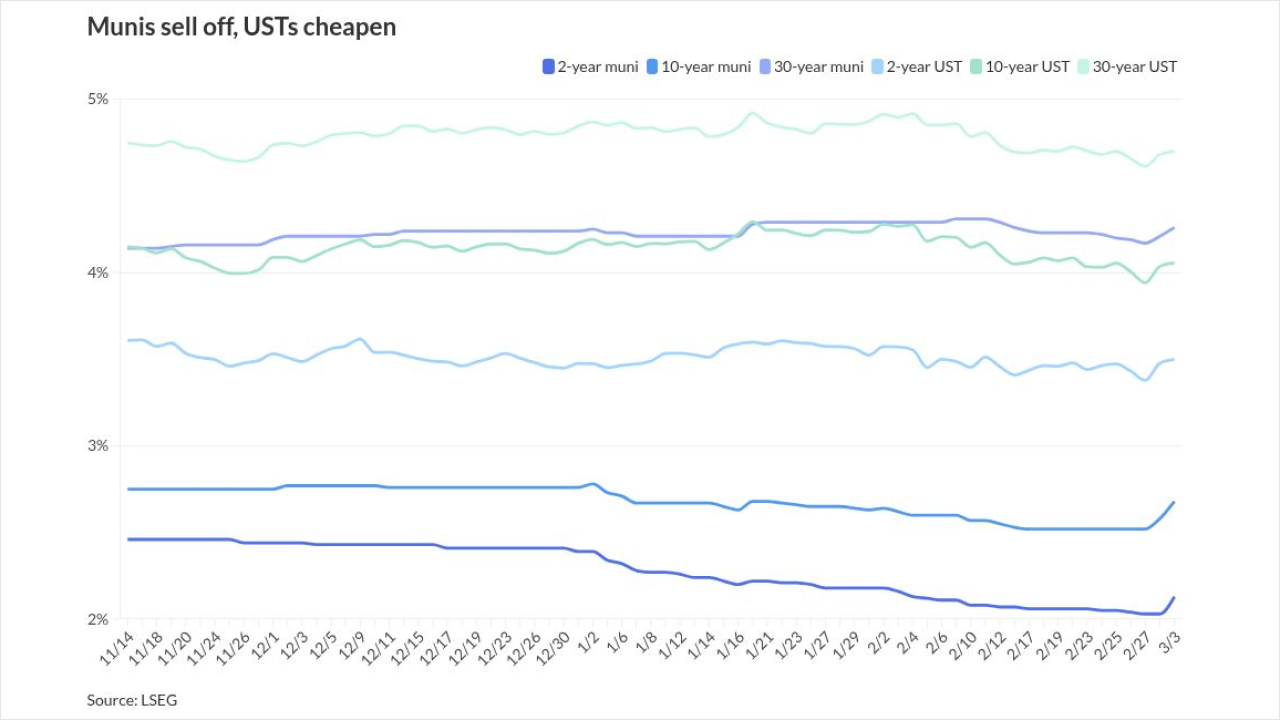
LOS ANGELES — The Los Angeles Unified School District brings the largest deal of the muni primary market's busiest week in almost a year with the help of two freshly minted, high-level ratings.
The $1.2 billion deal is scheduled to price Tuesday, highlighting a week in which $10.1 billion of municipal bonds are slated to hit the primary market, the most since March 2015.
LAUSD's operating budget struggles appear to be outweighed from a rating standpoint by new legal arguments that California school general obligation credits should be considered separately from operations.
The deal comes with brand-new ratings from two agencies: AAA from Fitch Ratings and AA-plus from Kroll Bond Rating Agency. Moody's Investors Service affirmed its Aa2 rating, and Standard & Poor's, which most recently assigned LAUSD its AA-minus rating in 2015, was not asked to rate the deal.
Citi is bookrunner, Public Resources Advisory Group is financial advisor, Hawkins Delafield & Wood LLP is bond counsel and Orrick Herrington & Sutcliffe is disclosure counsel. The bond proceeds will be spent on long-needed modernization projects on the district's buildings, which have an average age of 50-to-70-years, said Tim Rosnick, LAUSD's controller.
The bonds are backed through Measure Q, a $7 billion bond measure, backed by a dedicated property tax, that voters approved in 2008.
Several school districts have sought to highlight that special tax backing, led by San Diego Unified School District in November, when it asked the rating agencies to consider legal opinions that the say the property taxes backing California local school GOs benefit would be considered "special revenues" in a Chapter 9 bankruptcy.
San Diego Unified argued that the much stronger dedicated ad valorem property tax stream is the source of repayment for the bonds, not its less robust general fund, and that its rating should reflect that.
The district also highlighted a state law passed in 2015 to clarify that a statutory lien makes bondholders of California local GOs a secured creditor in any bankruptcy.
The rating agencies appeared to be more compelled by the "special revenues" argument than the SB 222 lien.
So far, Fitch appears to be giving the opinions the greatest weight, assigning AAA ratings to several California school districts with solid assessed valuations, though the rating agency also provides a lower "underlying rating" that considers operations; LAUSD received an A-plus "issuer default" rating.
Since November, Fitch has given San Diego Unified, Evergreen Union School District in San Jose, Sweetwater Unified School District in San Diego and LAUSD AAA GO ratings based on special revenue opinions provided by legal counsel, said Karen Ribble, a Fitch senior credit analyst.
Fitch gave West Contra School District a AA-plus rating, but the district had a very high debt load, Ribble said.
LAUSD's AAA rating is based "on the property tax base as well as the moderate debt load and the area's growing economy," Ribble said. "And, because we were provided with legal counsel that revenues would be treated as special revenues in a bankruptcy."
Fitch hasn't changed its approach to rating California school districts, though the legal opinions were considered in the ratings, said Amy Laskey, a Fitch managing director.
Kroll looks at four key rating determinants, but also considers the legal opinion as an "additive factor," according to its report.
It views LAUSD's financial position as strong despite enrollment declines and concerns about pension liability, "because time and time again, the management team has demonstrated the ability to achieve operating surpluses," said Jenny Maloney, a Kroll director.
The district admits that its operating budget is challenged; it released a 75-page independent report in early November that projected a $333 million deficit in 2017-18 that could balloon to $600 million by 2020 if the district did not take immediate action to cut costs. It warned of growing pension liability and declining enrollment, the latter brought on by competition from charter schools and low birth rates.
The school district commissioned the panel to take a long-term look at school finances as a proactive measure, said Megan Reilly, the district's chief financial officer.
In November, Moody's deemed the school district's move to create the task forces and get ahead of the issues a credit positive.
Superintendent Michelle King, appointed to head the district in January, has formed four different committees to study the major issues highlighted in the report, Reilly said.
"Each committee is reporting to the district's senior leadership on the different agendas and items being reviewed," Reilly said. "She has not allowed any time to pass without taking action."
The committees are looking at how to improve attendance and enrollment to grow revenues, right-size staff to match the district's declining enrollment, streamline business operations and to consider why special education programs aren't receiving full federal reimbursements, Reilly said.
Increases in charter school enrollment and declines in birth rates have caused the district's student enrollment to plummet to 542,000 recently, a 100,000 drop in a six-year period, according to recent school district figures.
Reilly said because projected deficits are two years out, and the district currently has a balanced budget, it has time to use attrition and what she called gentler management tools to right-size staff.
Kroll will continue to monitor the district's progress and have open communication with the district, Maloney said.
"The district's debt burden, including the debt of overlapping issuers, is relatively low at 3.4% of its substantial $570 billion assessed valuation," Maloney said.
"It will be an extremely attractive bond when it gets priced," said Michael Ginestro, head of municipal credit research at Bel Air Investment Advisors LLC.
There are too many macro factors moving the muni market in a positive direction for it to be otherwise, Ginestro said. Muni flows are strong and property values in the school district's boundaries are strong, he said.
The district's positive factors far outweigh the negative, he said.





